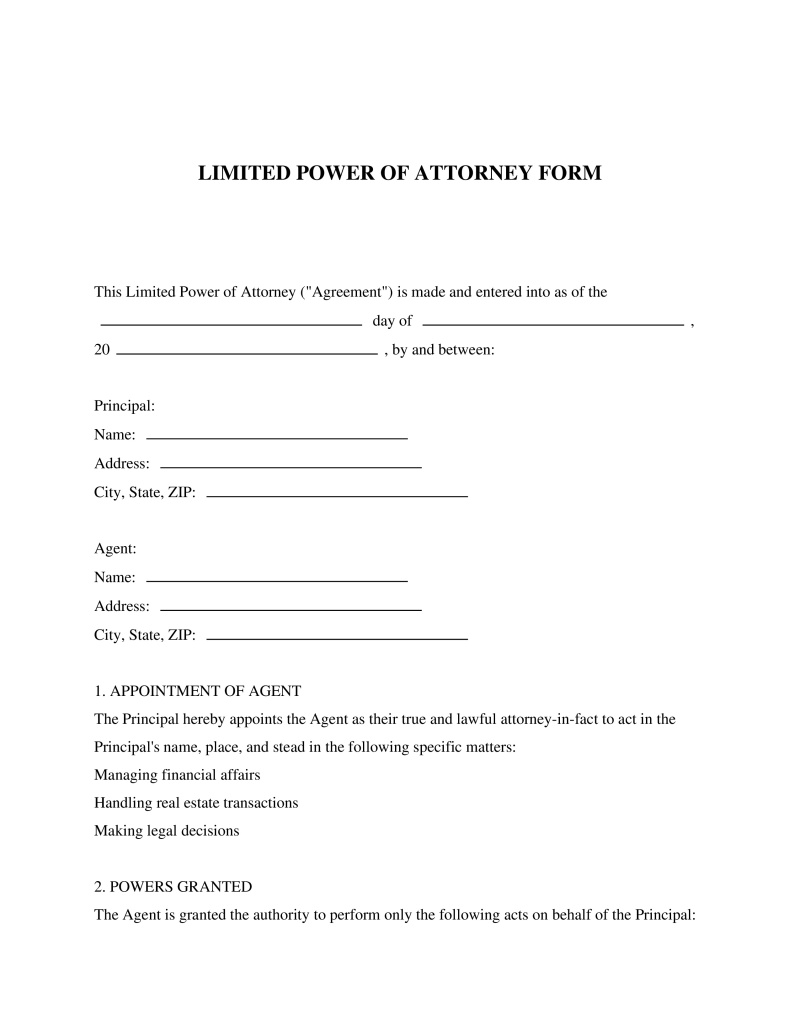A Limited Power of Attorney Form grants specific authority to another person for designated tasks, often used in financial or legal matters.
Principal Name
Enter the full legal name of the person granting the power of attorney.

Table of Contents
What is a Limited Power of Attorney Form?
A Limited Power of Attorney Form is a legal document that grants a designated person or entity, known as the agent, the authority to act on behalf of the principal in specific matters for a limited period of time. This form delineates the scope of powers granted to the agent, ensuring that they have just enough authority to perform certain acts or decisions without giving them carte blanche over all of the principal's affairs. Individuals often need this document when they are unable to manage certain aspects of their lives due to travel, illness, or other commitments and wish to entrust someone with specific powers like handling financial transactions, managing real estate assets, or making healthcare decisions.
Key Features
Important Provisions
- Identification of both principal and agent along with contact information.
- Specific enumeration of powers granted, including any limitations on those powers.
- Duration clause stating when the power starts and ends.
- Revocation terms detailing how and under what circumstances the document can be terminated by the principal.
- Signature section including dates and notary acknowledgment where applicable.
Pros and Cons
Pros
- +Allows individuals to manage their affairs efficiently through a trusted third party when they are unable to do so themselves.
- +Minimizes risk by limiting the agent's power to specific tasks or transactions.
- +Highly customizable to suit various needs and circumstances.
- +Provides legal protection for both the principal and agent by clearly outlining duties and responsibilities.
- +Can be executed quickly compared to more comprehensive powers of attorney, making it ideal for immediate needs.
Cons
- -If not precisely drafted, may lead to ambiguities about the extent of power granted.
- -Requires thorough understanding and consideration to ensure it does not grant more power than intended.
- -Limited duration means it may need to be renewed or replaced for ongoing matters.
Common Uses
- Authorizing someone to sell or manage real estate properties on behalf of the principal.
- Granting permission for an agent to handle financial transactions such as banking activities while the principal is unavailable.
- Allowing an agent to make healthcare decisions under specific circumstances when the principal cannot do so themselves.
- Delegating authority to conduct business transactions or negotiations during periods of absence.
- Enabling someone to handle tax filing and related matters for a specified tax year.
- Authorizing representation in legal proceedings or dealings with government agencies.
Frequently Asked Questions
Do you have a question about a Limited Power of Attorney Form?
Example questions:
Not the form you're looking for?
Try our legal document generator to create a custom document
Community Discussion
Share your experience and help others
Legal Notice: Comments are personal opinions and do not constitute legal advice. Always consult a qualified attorney for matters specific to your situation.
Comments (0)
Leave a Comment
No comments yet. Be the first to comment!